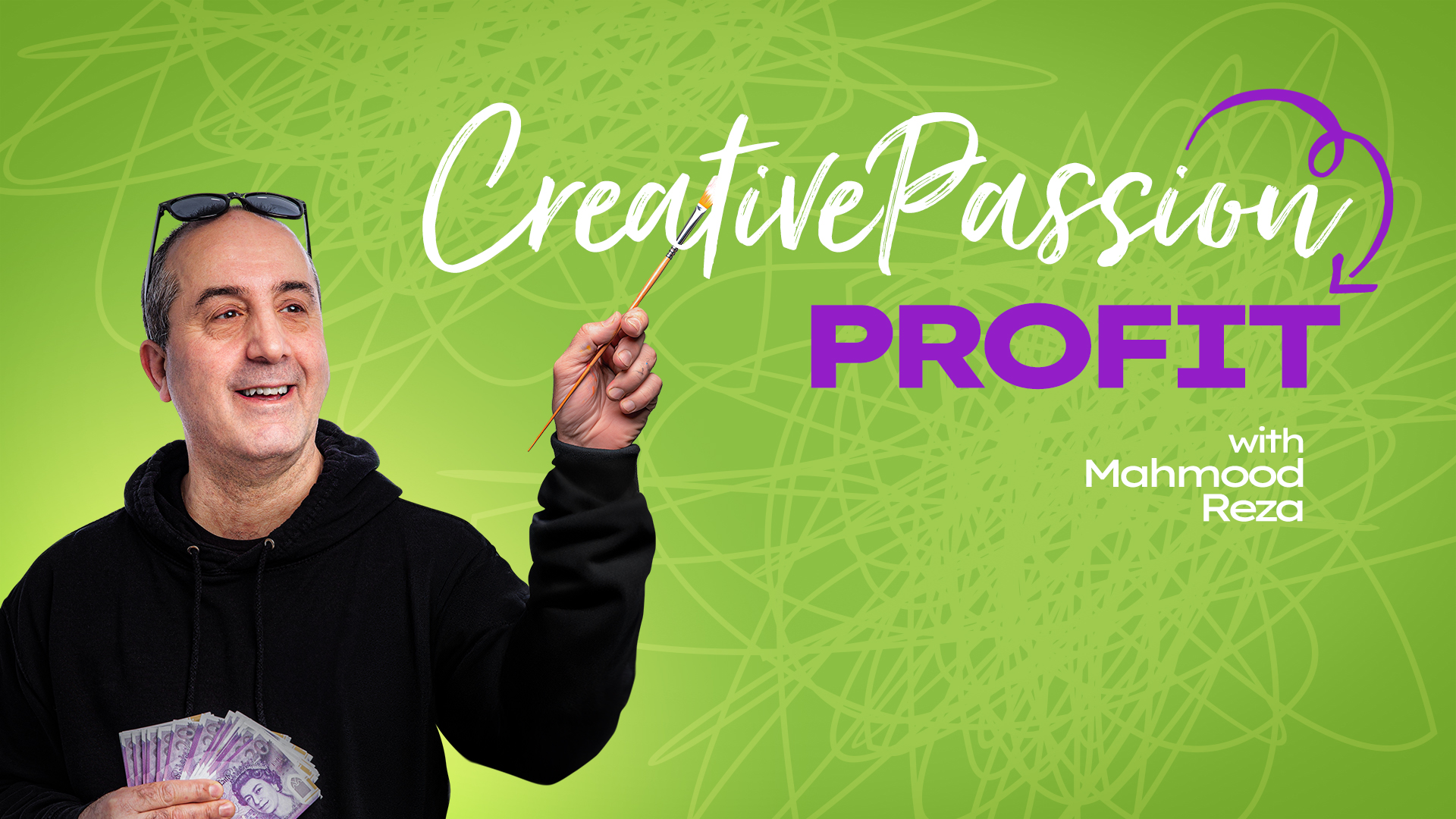How creatives can budget for regular income!
Creative Success = Financial Balance with Flexible Budget Plans
As a creative individual, dealing with irregular income can be daunting.
In this episode of From "Creative Passion To Profit", titled "How Creatives Can Budget for Regular Income," I, Mahmood, tackle one of the biggest challenges faced by those in the arts and creative world—budgeting.
Have you ever felt the high of being fully booked and having commissions flying off the shelves, only to be met with silence and income droughts the following month?
You're not alone.
But here's the good news: with a little planning, you can smooth out those financial ups and downs.
In this episode, I'll share three simple steps to help you build a budgeting system that fits your lifestyle and supports your creative ambitions.
You'll learn how to determine your essential baseline expenses, create a financial buffer for quiet months, and implement a flexible yet simple budgeting method that allows you to thrive creatively and financially.
You'll also have some homework tasks...
Timestamped Summary:
- [00:00:00] Introduction to challenges of budgeting with erratic income.
- [00:00:58] Step 1: Determine your baseline expenses.
- [00:02:12] Step 2: Build a financial buffer for quieter months.
- [00:03:46] Step 3: Apply a simple, discipline-based budget system.
- [00:04:58] Homework: Calculate baseline expenses and track income.
Mentioned in this episode:
Training
Training
Find out more about Budgetwhizz
Find out more about Budgetwhizz
Transcript
Welcome to From Creative Passion to Profit. And today, I'm going to be
Speaker:diving into a big challenge for so many people in the arts and
Speaker:creative world. Budgeting. Budgeting. When your income feels
Speaker:like that roller coaster. One month you're top of the world, your book's
Speaker:solid, everybody loves you, you're selling commissions before we pack
Speaker:venues. And the next month, it's quiet. It's like
Speaker:crickets. Does that sound familiar? Well, you're not alone. It's
Speaker:irregular. Erratic income is a reality for so many
Speaker:creatives. But there's good news. With a little bit of planning,
Speaker:you can make it work for you instead of against you. And
Speaker:today I'm going to be sharing three simple steps to help you build a
Speaker:budget that accommodates and fits your lifestyle so you
Speaker:can take control of your finances and keep thriving
Speaker:creatively.
Speaker:Now, here's our game plan for today. I'm going to figure out your
Speaker:baseline expenses, what selling you will be doing. Number two,
Speaker:build your buffer for those slower months. And thirdly, use
Speaker:a simple but flexible budgeting system. Let's start with step one,
Speaker:figuring out your baseline expenses. Now, those baseline
Speaker:expenses are the essentials. Those things that you need to
Speaker:make sure you're covering every single month, irrespective of how
Speaker:busy or quiet you are. So think about your rent, your food,
Speaker:utilities, Internet, the basics that keep you
Speaker:ticking over, the basics that keep you going. Now, take a moment
Speaker:to write them all down. Grab a pen, open a notes app,
Speaker:or check the link at the end. And there is a free
Speaker:budget whiz plan that you can tap into to use.
Speaker:Now, if you don't like online, you prefer to do it on pen or paper.
Speaker:Grab that sheet of paper and now write those items down.
Speaker:Put the headings there, put the amount, if you have no idea, then check
Speaker:your bank statements, check your credit card statements. But let's assume that
Speaker:baseline figure comes to £1,500 per month. Now, that's your
Speaker:target. That's the amount you need to make sure you generate by way of
Speaker:income, just to keep your head above water, to keep you afloat.
Speaker:Now, fixing that number, having an appreciation of what that number is, will give
Speaker:you a clear and solid foundation to work from. Step two,
Speaker:build yourself a buffer. Now, once you earn your baseline, it's
Speaker:time to create that safety net. Now, the buffer is the thing that
Speaker:covers you during those quieter months, of which there will be some.
Speaker:Every single business has quiet months. Every single business has
Speaker:more active months. When income slows down, you want to make
Speaker:sure you can Cover those quieter months. Think of it like a
Speaker:cushion, a financial cushion. Now let's see how it
Speaker:works. When you're having a busier month, make sure you get a
Speaker:discipline of putting aside a little bit extra. Even if it's a 50
Speaker:pound or 100 pound here, it accumulates and it builds up over
Speaker:time. What's your target? What's your aspiration? Well, my experience,
Speaker:my advice would be save up to make sure you've got at least three
Speaker:months worth of baseline expenses. So that means your target
Speaker:is with a 1500 pound baseline cost, you're aiming
Speaker:to get a 4500 pound buffer. Now that might sound
Speaker:dramatic, that might sound impossible, but it's not.
Speaker:Get into the habit of putting money aside. Get into the habit of
Speaker:squirreling away that money. Get a separate bank account, get a separate deposit
Speaker:account, but make sure you accumulate the that cushion. That
Speaker:doesn't have to happen overnight. Think small, but it's consistent
Speaker:steps that will get you there. Now, if you've finished a big commission, a
Speaker:piece of work, great, celebrate and spend some. But make sure you
Speaker:put something away. The future, you will thank the present you
Speaker:for this. Now step three, use a simple budget. Now this
Speaker:is budgeting without the stress. It's not a straight jacket, it's a discipline.
Speaker:And I promise you folks, it's a fantastic discipline to get
Speaker:into. Now, we're not talking about complicated spreadsheets. If they're not your
Speaker:thing, try this simple approach. Divide your income into
Speaker:three easy categories. Number one, the essentials.
Speaker:That's for things like rent, bills and food. You want to eat and you don't
Speaker:want to be homeless. These are the non negotiables.
Speaker:Secondly, fun. Yet you need to make sure you build into your life
Speaker:a bit of fun. Fun is important. It's a great stress reliever. It could be
Speaker:a night out, could be effectively a workshop, a doll's
Speaker:workshop, meeting up with friends, whatever, it's your creativity
Speaker:fuel. And thirdly, it's the savings. This is your
Speaker:buffer and it helps towards those long term goals. Could be a
Speaker:holiday, could be taking time out, could be some training that you've got your
Speaker:eye on, buying new equipment or funding your next project. You
Speaker:decide what that should be. Now, the beauty of the system is
Speaker:flexibility. One month you might allocate more to fund because you
Speaker:had a great run of work. It's been prosperous for you. Another
Speaker:month you might focus on building up your buffer. It's about
Speaker:adjusting and making those modifications as you go.
Speaker:Now, don't use the word homework. But let me give you some homework. Some things
Speaker:I want you to focus on. Two things. Firstly, write
Speaker:down. Calculate what your baseline expenses are.
Speaker:Write them down so you know your largest commitment. And number
Speaker:two, start tracking. Not quite Davy Crockett style, but
Speaker:start tracking your income. It doesn't have to be fancy, but just get into the
Speaker:habit of noting down what's coming in and what's going out. I promise
Speaker:you, once you start connecting with those numbers, you will start to feel more
Speaker:in control and the anxiety will diminish. Even these
Speaker:very small modifications, these small steps will make a massive
Speaker:difference. That's it for today's episode, folks, of From
Speaker:Creative Passions to Profit. I hope you're feeling more confident about
Speaker:tackling those ups and downs. Remember, budgeting does not have
Speaker:to be a headache. As I mentioned, check out Budget Wiz.
Speaker:We do have a free plan. You can do your planning online.
Speaker:With the right tool and the right mindset, it will actually give you more
Speaker:freedom to focus on what you love.




